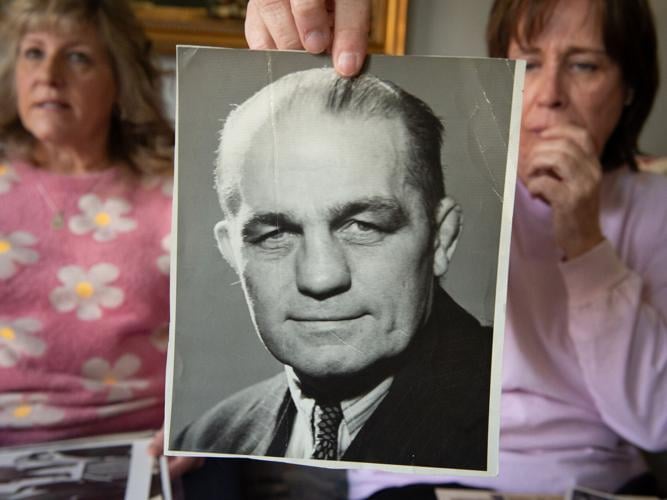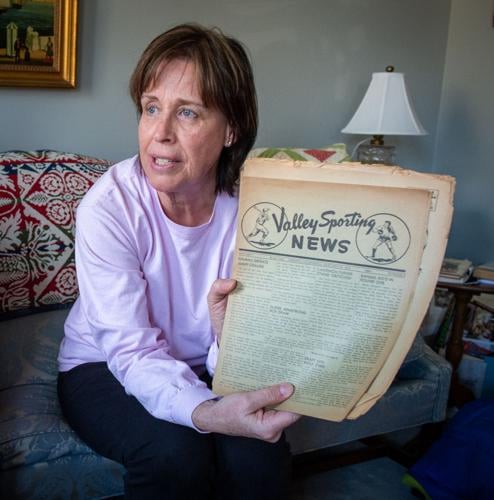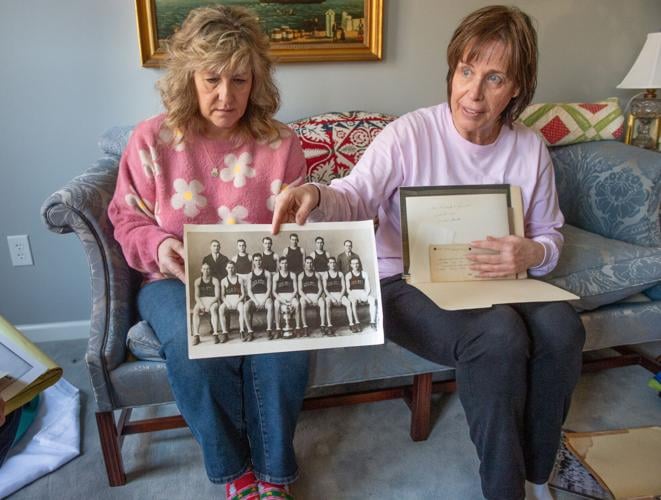Lifelong Lancaster city resident Joe Hauck died in June. He was 88 and the last survivor of the six children born to Lancaster’s Leo Houck Sr.
Joe Hauck’s death has put a damper on a torch of sorts that he carried most of his adult life: championing the prolific boxing career of his dad.
The third of six children who grew up in the city’s working-class Cabbage Hill neighborhood, Leo Hauck began fighting in 1902 at age 14. A local sportswriter and boxing promoter misspelled young Leo’s last name, changing it to Houck in the advance publicity for his first professional fight. The spelling remained Houck for the rest of Leo’s life, though the rest of his family has remained “Hauck.”
Houck was among the best middleweight boxers in the world in the 1910s, part of a 20-year in-ring career that featured more than 200 fights, his last full season coming in 1922, which he followed by becoming the coach at Penn State and turning the program into a collegiate boxing powerhouse over the next few decades until his death in 1950.
Houck was posthumously inducted into three Halls of Fame, in part due to efforts put forth by the late Johnny Hauck, his youngest brother, and later by Joe Hauck, his youngest son.
Throwback: John Walk talks with Joe Hauck, son of boxer Leo Houck, for Inspirational Athletes podcast
Among the nearly two dozen adult grandchildren of Leo Houck Sr., there is no indication anyone within the family will be filling the shoes of Joe Hauck in keeping their grandfather’s boxing legacy alive.
That legacy must instead be recalled in other ways.
For the three adult children of Joe Hauck, it will come in the form of the valuable boxing-related items they inherited from their dad.

Lancaster boxer Leo Hauck is in the center of this picture inside the Lancaster Township home of his daughter Lori Hauck Irvin Tuesday, Dec. 12, 2023.
‘It wasn’t easy’
Joe Hauck was 15 when his dad died. He never saw his father fight. But he remembered the few trips he took from Lancaster to State College to see his dad coach at Penn State. It’s a trip Leo Houck Sr. made every weekend during the boxing season, returning home to Lancaster on the weekends.
“Take away all the four-lane highways and go through every town, two-lane roads, and you have an idea of what it was like to go up to Penn State,” Joe Hauck told LNP | LancasterOnline in a 2019 interview. “I went up in 1948 and it was a drag … in those days, let’s face it, you were up in the mountains.”
Joe Hauck became an avid antiques collector as an adult. Combine that with the passion he had for his father, and it resulted in Hauck collecting everything he could find on his father’s boxing career. Multiply those two passions by decades and you get boxes upon boxes filled to the brim on all things Leo Houck Sr. Those boxes are now left to Joe Hauck’s son Joey Hauck and daughters Ursula Fiorill and Lori Hauck-Irvin, the siblings tasked with figuring out what to keep or discard.
“It wasn’t easy,” Fiorill said. “We all had to agree on how things were going to be handled. Some of the stuff was duplicated, which made it easier for us to take that to the auction. I kept some things. Lori kept some things. Joey kept some things.”
Most things kept by the family were the originals: photographs, posters, fliers, magazines and boxing programs featuring Leo Houck Sr.
Joe Hauck often made several copies of such items and mailed them to others with ties or interests in Leo Houck Sr., like author Randy Swope, who published a biography on Leo Houck Sr. in 2019 and regularly received packages from Joe Hauck over the next four years.
“Joe just adored his dad,” Swope said. “He was in complete adoration of his father.”
The subtitle on Swope’s biography of Leo Houck describes the boxer as an “uncrowned middleweight champion.”
The label comes from a muddled circumstance in 1914, when George Chip became middleweight champion. Earlier in his career, Chip had lost to Houck. So after Chip became champ, a bout was put on the books between Chip and Houck for the middleweight crown.
In the interim, Chip suffered a surprise knockout to Al McCoy, then an unknown who claimed the middleweight title and held it for the next three years, ducking Houck the entire span; the two never stepped into the same ring.
Leo Houck Sr. went on to collect 144 wins, 39 losses, 27 draws and one no-contest, and was never knocked out, finishing all but one match of his prolific in-ring career in 1923. He fought one last bout in 1926.
On Nov. 18, 1922, Houck drove to the University of Pennsylvania and, in the moments after its football team edged Penn State 7-6, he approached Nittany Lions’ gridiron boss and athletic director Hugo Bezdek about the school’s vacant boxing coach position. Bezdek hired Houck on the spot.
Months after Houck’s death in 1950, a young assistant football coach named Joe Paterno arrived on the Penn State campus. When Paterno had ascended to legendary status in college football a few decades later, he received a letter from Ed Hauck, one of Leo Houck’s four sons. Hauck family lore has it that Paterno wrote back something along the lines of the following: “When I came here, I actually had to fill Leo Houck’s shoes.’ ”
The Penn State boxing program disbanded in 1954, part of the sport succumbing at the college level that decade. Houck and others are now remembered inside the Penn State All-Sports Museum at Beaver Stadium.

Lori Hauck Irvin shows replicas of poster from her grandfather Leo Hauck’s boxing career inside her Lancaster Township homeTuesday, Dec. 12, 2023.
More Boxing News:
- Lancaster-based fighters set for National Silver Gloves
- 'Down goes Frazier': 51 years ago, George Foreman knocked Joe Frazier down 6 times [video]
Tangible reminders
The boxing collection within the Penn State All-Sports Museum contains a punching bag once used by the Lions’ pugilists, along with old boxing gloves and photographs of some of the program’s most successful boxers.
Among them is the late Billy Soose, who went on to win the world middleweight championship in 1941 and was inducted into the International Boxing Hall of Fame in 2009.
Cinema buffs can think of Houck when they watch the 1942 Academy Award winning film “Casablanca;” screenwriters Julius and Phillip Epstein boxed for Houck at Penn State in the 1920s, when dual meets and tournaments on campus often filled Rec Hall, which in recent decades housed a large painting of Houck.
“Somewhere along the lines they took down Leo’s painting,” Cory Van Brookhoven said. “I hope it’s in storage and they didn’t get rid of it.”
Van Brookhoven is the president of the Lititz Historical Society. He’s also an author. At a book signing in 2006, he met Joe Hauck, who soon made Van Brookhoven a boxing fan of Leo Houck. Van Brookhoven is now the owner of a rare Houck item: a 1910 trading card that was originally included in a pack of Turkish Whiffs cigarettes.
A similar Houck card is included in the Smithsonian’s National Museum of American History. The card is likely in the museum not because of Houck but to instead show the advertising lengths a cigarette company went to in order to reach consumers in the early 20th century.
Van Brookhoven has several binders of information on Leo Houck, along with a few hundred boxing photos he once purchased at an auction in Berks County.
“What these were, Johnny Hauck would make copies of things on photo paper and mail them to boxing correspondents he wrote to,” Van Brookhoven said.
Johnny Hauck became one of the nation’s premier boxing historians over the course of his adult life before his death in 1977; Hauck willed his boxing collection to the Lancaster County Historical Society.
Two years before his death, Johnny Hauck was given the George W. Kirchner Memorial Award at the 1975 Lancaster Sportswriters and Broadcasters banquet.
The award has since become the top honor given out annually at the Lancaster County Sports Hall of Fame banquet. The award gets its name from a man, George Kirchner, who was a Lancaster newspaper sports editor from 1929 to 1965.
Kirchner was also an honorary pallbearer at Leo Houck Sr.’s funeral and wrote this after the boxer’s death in 1950: “The thing we always liked about Leo was his extreme modesty. … many ‘oldtimers’ like to talk about their records. … But Houck was different in this respect. … He simply didn’t like to talk about his past record. ‘People,’ he used to say, ‘will get an idea that I’m going around boasting.’ ”
Swope suspects Leo Houck Sr.’s humility stemmed from his devout Catholic faith.
“He felt as though you didn’t need to make a fuss over him,” Swope said.
So it’s probably a safe bet to assume Leo Houck Sr., if he could speak from the grave, wouldn’t much render an opinion on the matter of how his boxing legacy will live on from this point.
“I don’t think grandpop would care,” Lori Hauck-Irvin said of her paternal grandfather. “He was very humble.”
“I think he would shrug his shoulders,” Van Brookhoven said. “And say, ‘It’s no big deal, I was who I was.’”
In December 1950, a plaque memorializing Leo Houck Sr.’s boxing prowess was unveiled at Stumpf Field, along Fruitville Pike in Manheim Township. The plaque has since been relocated to Buchanan Park, about a mile north of Houck’s childhood home, which has a third-floor feature on the walls: Houck’s kid brothers’ large pencil drawings of him.
These are a few of the tangible items we can use to remember Leo Houck Sr., a task made a bit more challenging with Joe Hauck no longer here to remind us about his dad.













 JOHN WALK | Features Writer
JOHN WALK | Features Writer
 STEPHANIE ZEIGLER | Managing Editor of Content
STEPHANIE ZEIGLER | Managing Editor of Content
![Author discusses book about Lancaster's Hall of Fame boxer Leo Houck [Q&A]](https://bloximages.newyork1.vip.townnews.com/lancasteronline.com/content/tncms/assets/v3/editorial/8/f4/8f49544e-a520-11ea-a4f8-9398a821ad81/5ed6d314c7cc7.image.jpg?resize=140%2C200)
 JOHN WALK | Sports Writer
JOHN WALK | Sports Writer

